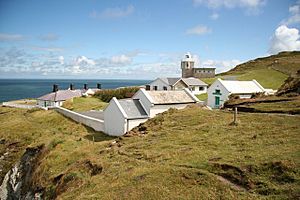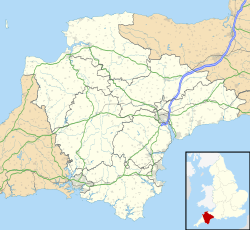Bull Point Lighthouse facts for kids
 |
|
| Bull Point Lighthouse | |
|
|
|
| Location | Mortehoe Devon England |
|---|---|
| Coordinates | 51°11′56.8″N 4°12′04.4″W / 51.199111°N 4.201222°W |
| Year first constructed | 1879 (first) 1972 (second) |
| Year first lit | 1974 (current) |
| Automated | 1975 |
| Construction | brick tower (current) metal skeletal tower (second) |
| Tower shape | cylindrical tower with balcony and lantern attached to 1-storey keeper's house |
| Markings / pattern | unpainted tower, white lantern |
| Height | 11 m (36 ft) |
| Focal height | 54 m (177 ft) |
| Current lens | small 6 panel 3rd order catadioptric optic |
| Intensity | 89,900 candela |
| Range | 24 nmi (44 km) |
| Characteristic | Fl (3) W 10s. |
| Admiralty number | A5600 |
| NGA number | 6228 |
| ARLHS number | ENG 017 |
The Bull Point Lighthouse is a lighthouse located on Bull Point. This spot is about 1.6 kilometers (1 mile) north of the village of Mortehoe in Devon, England. The lighthouse helps ships navigate the northern coast of Devon. It guides them safely past the villages of Mortehoe, Woolacombe, and Ilfracombe. It also warns sailors about the dangerous, rocky coastline in the area.
Contents
The First Bull Point Lighthouse
Why a Lighthouse Was Needed
The first lighthouse at Bull Point was built in 1879. Local leaders, ship owners, and business people asked Trinity House to build it. Trinity House is the official authority for lighthouses in England. They wanted a lighthouse to make the coast safer for ships.
Building the Original Lighthouse
The lighthouse was built on Bull Point itself. Some people wanted it built on a dangerous rock called the Morte Stone. But Bull Point was chosen instead. The first lighthouse was a round tower, about 9 meters (30 feet) tall. It was made from local stone and other strong materials. A large lantern sat on top, making the total height about 17 meters (55 feet).
How the Old Light Worked
Inside the lantern, a special lens helped the light shine brightly. This was a Fresnel lens, which is like a giant magnifying glass for light. It made the light very powerful. The light used an oil lamp and spun around. It flashed three times every 30 seconds. This light could be seen from about 47 meters (154 feet) above the sea. There was also a separate red light. This red light shone from a window to warn ships about the Morte Stone.
Fog Signals and Keepers' Homes
The lighthouse also had a loud fog siren. This siren would blast three times every two minutes. It helped ships find their way when it was foggy. The siren was powered by special engines in a separate building.
Next to the lighthouse were homes for the lighthouse keepers. These were the people who lived there and made sure the light and fog signal worked. The homes, tower, and engine room were all connected by walkways.
Upgrades Over the Years
Over time, the lighthouse was updated. In 1919, a new, louder fog siren was installed. In 1960, the lighthouse became electric. This meant it no longer needed oil lamps. New equipment for the light and fog signal was also added.
The Current Bull Point Lighthouse
A New Lighthouse is Built
In September 1972, the land where the old lighthouse stood started to sink. This made the lighthouse unsafe. So, Trinity House had to build a new one. For two years, they used a temporary light tower from another location.
The new lighthouse was finished in 1974. It cost about £71,000 to build. It was placed further inland, away from the unstable cliff edge. Many parts from the old lighthouse were reused in the new one. This included the light and fog signal equipment from 1960. The red warning light for the Morte Stone was also kept.
Modern Lighthouse Operations
The current lighthouse is 11 meters (36 feet) tall. It was made fully automatic in 1975. This means no one needs to live there to operate it anymore. The light is very bright, with an intensity of 800,000 candelas. It can be seen from about 44 kilometers (24 nautical miles) away.
The loud foghorn was turned off in 1988. However, the old equipment for it is still inside the lighthouse. The lighthouse was fully automated in 1995.
Visiting the Lighthouse
You can visit the area around the lighthouse. There's a public path right next to it. The old homes where the lighthouse keepers used to live are now rented out to people on holiday.
Gallery




